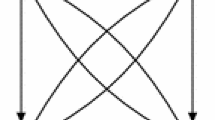Abstract
A tournament is any complete asymmetric relation over a finite set A of outcomes describing pairwise comparisons. A choice correspondence assigns to every tournament on A a subset of winners. Miller's uncovered set is an example for which we propose an axiomatic characterization. The set of Copeland winners (outcomes with maximal scores) is another example; it is a subset of the uncovered set: we note that it can be a dominated subset. A third example is derived from the sophisticated agenda algorithm; we argue that it is a better choice correspondence than the Copeland set.
Similar content being viewed by others
References
Banks JS (1985) Sophisticated voting outcomes and agenda control. Soc Choice Welfare 4: 295–306
Bermond JC (1972) Ordres a distance minimum d'un tournoi et graphes partiels sans circuits maximaux. Math Sci Hum 37: 5–25
Bordes G (1983) On the possibility of reasonable consistent majoritarian choice: some postive results. J Econ Theory 31: 122–132
Copeland AH (1951) A reasonable social welfare function (mimeo). University of Michigan, Ann Arbor (Seminar on Application of Mathematics to the Social Science)
Farqharson R (1969) Theory of voting. Yale University Press, London
Fishburn P (1977) Condorcet social choice functions. SIAM J Appl Math 33: 469–489
Henriet D (1985) The Copeland choice function: an axiomatic characterization. Soc Choice Welfare 2: 49–63
Kemeny J (1959) Mathematics without numbers. Daedalus 88: 571–591
McKelvey RD (1983) Covering, dominance, and institution-free properties of social choice (mimeo). California Institute of Technology, Pasadena
McKelvey RD, Niemi RG (1978) A multistage game representation of sophisticated voting for binary procedures. J Econ Theory 18: 1–22
Miller N (1977) Graph theoretical approaches to the theory of voting. Am J Pol Sci 21: 769–803
Miller N (1980) A new solution set for tournaments and majority voting: further graph theoretical approaches to the theory of voting. Am J Pol Sci 24: 68–96
Miller N (1984) Solution sets for complete digraphs and weak social preferences (mimeo). University of Maryland, Baltimore
Moon J (1968) Topics on tournaments Holt, Rinehart and Winston, New York
Moulin H (1979) Dominance solvable voting schemes. Econometrica 47: 1337–1351
Moulin H (1984) Choice functions over a finite set: a summary. Soc Choice Welfare 2: 147–160
Rubinstein A (1980) Ranking the participants in a tournament. SIAM J Appl Math 98: 108–111
Schwartz T (1972) Rationality and the myth of the maximum. Nous 6: 97–117
Sen A (1977) Social choice theory: A reexamination. Econometrica 45: 53–89
Shepsle K, Weingast B (1982) Uncovered sets and sophisticated voting outcomes with implications for agenda institutions. Am J Pol Sci 28: 49–74
Slater P (1961) Inconsistencies in a schedule of paired comparisons. Biometrica 48: 303–312
Smith JH (1973) Aggregation of preferences with variable electorate. Econometrica 41: 1027–1041
Author information
Authors and Affiliations
Rights and permissions
About this article
Cite this article
Moulin, H. Choosing from a tournament. Soc Choice Welfare 3, 271–291 (1986). https://doi.org/10.1007/BF00292732
Received:
Accepted:
Issue Date:
DOI: https://doi.org/10.1007/BF00292732




